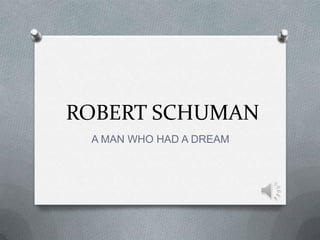
Robert Schuman - Father of European Unity (39
- 1. ROBERT SCHUMAN A MAN WHO HAD A DREAM
- 2. The statesman Robert Schuman, a qualified lawyer and French foreign minister between 1948 and 1952, is regarded as one of the founding fathers of European unity. Schuman was born in Luxembourg and was influenced by his background in the French-German border region. Despite, or maybe as a result of his experiences in Nazi Germany, he recognised that only a lasting reconciliation with Germany could form the basis for a united Europe. Deported to Germany in 1940, he joined the French Resistance upon fleeing two years later. In spite of this, he showed no resentment when, following the war, he became foreign minister. In cooperation with Jean Monnet he drew up the internationally renowned Schuman Plan, which he published on 9 May 1950, the date now regarded as the birth of the
- 3. European Union. He proposed joint control of coal and steel production, the most important materials for the armaments industry. The basic idea was that whoever did not have control over coal and steel production would not be able to fight a war. Schuman informed the German chancellor Adenauer of the plan, who immediately recognised the opportunity for a peaceful Europe and agreed. Shortly afterwards, the governments of Italy, Belgium, Luxembourg and the Netherlands also reacted.
- 4. The six states signed the agreement for the European Coal and Steel Community in Paris in April 1951. In this way, Europe began as a peace initiative. Schuman also supported the formation of a common European defence policy, and held the post of President of the European Parliament from 1958 to 1960.
- 5. Robert Schuman had a truly European background: born on 29 June 1886 in Luxembourg, his father was a Frenchman who became German when the region he lived in was annexed by Germany, whilst his mother was Luxembourgish. Schuman himself, however, was born a German citizen. When in 1919, after the First World War, the region of Alsace-Lorraine was returned to France, he became French. Before the war he studied law, economics, political philosophy, theology and statistics at the Universities of Bonn, Munich, Berlin and Strasbourg, and received a law degree with the highest distinction from Strasbourg University
- 6. After graduation, he set up his own law practice in Metz in 1912. Two years later the First World War broke out. Schuman was excused from military service on medical grounds. When the war ended he became active in politics, starting his career in public service as a member of the French Parliament for the Moselle region. When the Second World War began Schuman was a junior minister in the French government.
- 7. the French resistance during the war and was taken prisoner. Narrowly escaping deportation to the Dachau concentration camp, he fled to the „free‟ zone of France where he went into hiding after the Nazis invaded the zone. In hiding, with a 100 000 Reichsmark reward on his head, he defied the Germans for the next three years. He declined the invitation of French leader-in-exile de Gaulle to go to London, preferring instead to stay with his compatriots in Nazi-occupied France.
- 8. After the war he returned to national politics in a series of toplevel posts: firstly as Minister of Finance, as Prime Minister in 1947, Foreign Minister from 1948-1952 and again as Minister of Finance from 1955-56. He became a key negotiator of major treaties and initiatives such as the Council of Europe, the Marshall Plan and NATO: all initiatives aimed at increased cooperation within the western alliance and to unite Europe. But what Schuman became most known for is what is now called the „Schuman Declaration‟ in which he proposed to Germany and the rest of the European countries to work together towards a merger of their economic interests. He was convinced that when these were tied together, it would render war „not merely unthinkable, but materially impossible‟.
- 9. His speech did not fall on deaf ears, as German Chancellor Adenauer responded swiftly with a positive reply as did the governments of the Netherlands, Belgium, Italy and Luxembourg. Within one year, on 18 April 1951, the six founding members signed the Treaty of Paris. It created the European Coal and Steel Community - Europe‟s first supranational Community. This ground-breaking organisation paved the way for the European Economic Community and subsequently the European Union, which is still run by the innovative type of European institutions conceived in 1950.
- 10. However, his efforts did not stop there. He became a great proponent of further integration through a European Defence Community and in 1958 he became the first President of the predecessor to the current European Parliament. When he left office the Parliament bestowed on him the title of „Father of Europe‟. Because of the significance of his „Schuman Declaration‟ on 9 May 1950, this day has been designated as „Europe Day‟. And, in honour of his pioneering work towards a united Europe, the district housing the headquarters of several European Union institutions in Brussels is named after him.
- 11. In a speech delivered on 9 May 1950, inspired and for the most part drafted by Jean Monnet, Schuman proposed to place Franco-German production of coal and steel under one common High Authority. This organisation would be open to participation to other European countries. This cooperation was to be designed in such a way as to create common interests between European countries which would lead to gradual political integration, a condition for the pacification of relations between them: “Europe will not be made all at once, or according to a single plan. It will be built through concrete achievements which first create a de facto solidarity. The coming together of the nations of Europe requires the elimination of the age-old opposition of France and Germany”.
- 12. THE END DANIEL SÁEZ LOZANO